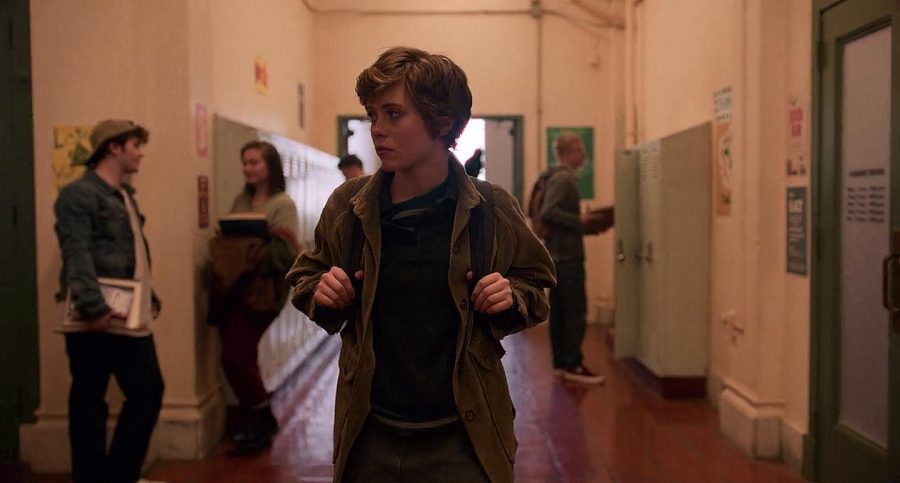The coming-of-age, supernatural horror-comedy-drama may have seemed to be a novel concept a few years ago, but with shows like “Stranger Things” and movies like “It” and “It Chapter 2,” the niche genre has quickly become popular and recognizable. Hence, the Netflix original series “I Am Not Okay with This,” which follows teen Sydney Novak (Sophia Lillis) as she discovers that she has superpowers, ran the risk of exhausting the premise which not too long ago had seemed avant garde. The show, produced by Shawn Levy from “Stranger Things” as well as staring two of the main actors from “It,” does not shy away from the comparison of other supernatural teen productions. However, “I Am Not Okay with This” makes use of clichés and tropes, new and old, and takes them a step further, creating something inventive enough to stand on its own merits.
Unlike some of its comparable peers, “I Am Not Okay with This” does not shy away from some of the gritty details that breathe life into the show. Levy relays on such details as how her father’s pickup always smelled like marijuana and the complicated reality of being a young adult in today’s society. Most teenagers decide to not acknowledge their changing bodies and past trauma like Sydney, who eats peanut butter instead of confronting her problems. The show adds vivid and–at times–grotesque detail to an archetype which is becoming increasingly played out. These simple details give depth and reality in ways that are often considered going too far. “Too real” might be the phrase of some to describe these additions. However, while some television feels like an airbrushed version of reality, “I Am Not Okay with This” delves into the messier parts of being young and human. Though the show is not perfect, with some aspects feeling contrived and some of the acting feeling forced, it succeeds where others fail in attempting to paint a more holistic and gritty picture of the human experience.
Another great aspect of “I Am Not Okay With This” is the way it casts and writes adolescents. In a rare case, real teens are playing real teens. There are no 25-year-old models playing so called “nerds” or “losers.” The show doesn’t just tell the viewer that these are awkward kids, it shows the viewer that these are awkward kids. They don’t dress well, they’re lanky, they have bad posture, they bond over their acne and they’re mean to their parents. The show demonstrates the actual teenage experience, instead of some destructive fantasy that we’ve seen far too many times.
As veterans of young adult movies and television shows, the dead-parent trope is not something new. However, “I Am Not Okay with This” brings something different to the overused concept. When the show begins, Sydney’s father has been dead for just over a year. It is revealed that he committed suicide and through the series, Sydney wrestles with the fact that he died without warning and without leaving a note. It is from this anger and grief that her powers begin to reveal themselves. Sydney argues with her mom, lashes out at school and struggles with the questions left by her father’s death: why didn’t he ask for help? Why did he leave no explanation? This version of what has become a cliché is now a raw and unabashed representation of grief. Sydney is angry and hurt and for her that manifests itself in outbursts of superhuman abilities. In the show, representations of power come only at points when Sydney’s emotions reach a breaking point. Power is not represented as something extraordinary but as something twisted and painful, the catharsis of a person in turmoil.
“I Am Not Okay with This” also takes an unconventional approach to another young adult cliché: the teen romance. The show does something that is distinct across the board by giving the lead a same-sex love interest. Sydney’s exploration of her sexuality is not unimportant to the story and it does not overshadow any of the other issues in her life either. The discovery and exploration of her sexuality is handled like the rest of the themes in the show. With gentle hands, Levy depicts the difficult but inextricable parts of growing up. Unlike some other productions that feature similar discoveries, “I Am Not Okay with This” does a great job of normalizing Sydney’s journey. Her revelation is not portrayed as her versus the world. She is not deeply certain of what she feels or how to act. Instead, it is an interpersonal struggle, something that involves self-acceptance, not other’s approval. Plus, with some superpowers, results in an entertaining watch.
Sophia Larson is a Collegian correspondent and can be reached at [email protected].



















